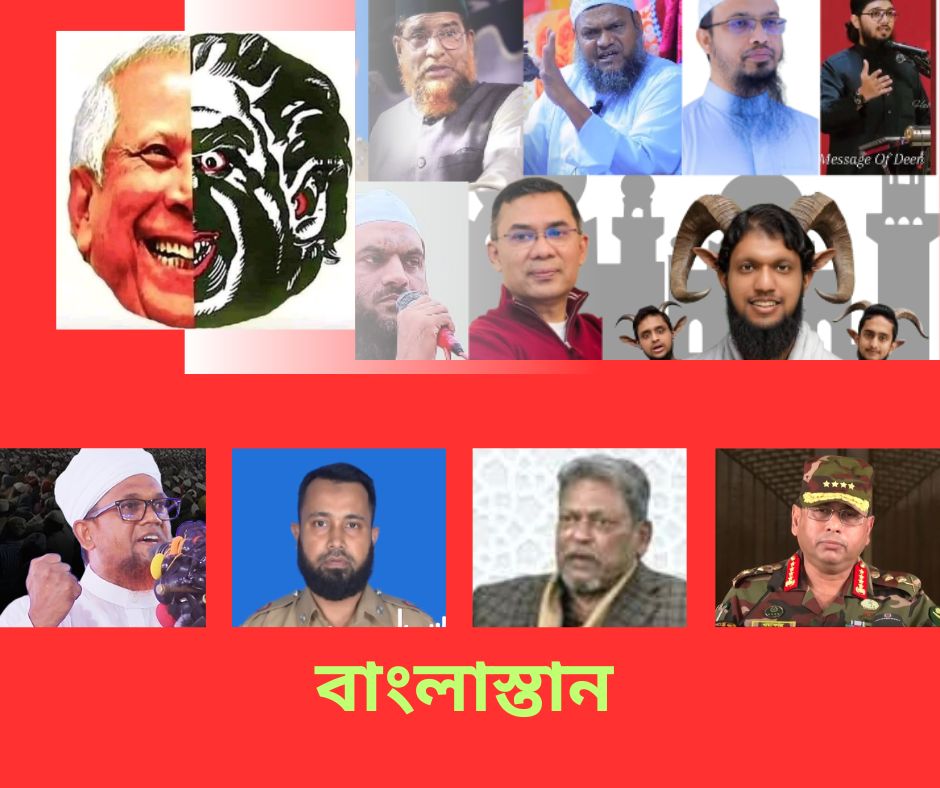The ongoing religious tensions in Kashmir, West Bengal and Seven Sisters are provoked by Bangladeshi Islamists, who are part of the Jamaat-controlled Yunus-led interim government.
Several advisers, leaders of Nagorik Party, Jamaat, Hefazat, Khelafat Majlish and AB Party, as well as jihadist leaders Jasimuddin Rahmani, Mufti Harun Izhar, Asif Adnan, Abu Twaha Adnan, Syed Ziaul Haque, Mizanur Rahman Azhari, Ahmadullah, Mamunul Haque, Chormonai Pir and Anayetullah Abbasi and social media influencers like Mahmudur Rahman, Pinaki Bhattacharya and Elias Hossain have been calling for jihad in India every day!
-Harkatul Jihad al Islami Bangladesh (HuJI-B) originated in Pakistan; linked to Taliban and al-Qaeda in Afghanistan; Bangladesh branch was launched in 1992; local aides include Jamaat-e-Islami, Khelafat Majlish, Islami Andolan Bangladesh, Hefazat-e-Islam, Hizb ut-Tahrir, RSO; status: active.
-Jama’atul Mujahideen Bangladesh (JMB) is an al-Qaeda affiliate launched officially in 1998; local aides include Jamaat-e-Islami, Islami Chhatra Shibir, Ahle Hadith, Hizb ut-Tahrir, RSO; status: active.
-Al-Qaeda in the Indian Subcontinent (AQIS) was formed in Pakistan in 2014 for jihad in Bangladesh, India and Myanmar, with focus on India; Bangladesh wing is known as Ansar al-Islam; local groups linked are JMB, Hizb ut-Tahrir, Islami Chhatra Shibir; Hefazat-e-Islam; initially known as Ansarullah Bangla Team; status: active.
-Islamic State (ISIS) launched its Bangladesh wing in late 2014; carried out at least 29 attacks till 2019, including Gulshan Holey Artisan Bakery massacre and Sholakia Eid Ground attack in 2016; local groups include Hizb ut-Tahrir, Ansar al-Islam, JMB, HuJI-B, Jamaat-e-Islami, Islami Chhatra Shibir, Islami Andolan Bangladesh, Hefazat-e-Islam, Rohingyas; status: active.
-Jama’atul Ansar Fil Hindal Sharqiya is an umbrella group of the Bangladeshi jihadists formed after the 2018 election as part of a broader movement alongside anti-Awami League political parties; linked to KNF, Hizb ut-Tahrir, Jamaat-e-Islami, Islami Chhatra Shibir, HuJI-B, Hefazat-e-Islam, Khelafat Majlish, Ansar al-Islam, ISIS. Status: active.
Selection of targets exposes their patrons
Islamic militants in Bangladesh have targeted a diverse range of groups, primarily focusing on those perceived as opposing their vision of an Islamic state, or Khilafah or Caliphate.
Religious Minorities
Hindus: Targeted for their faith, with attacks like the 2015 Kantaji Hindu temple bombing (10 wounded), killings by ISIS, and post-2013 political and communal attacks on Hindus from 2013–2021.
Buddhists: Victims include a 2016 Buddhist monk killing in Bandarban and a Buddhist farmer’s assassination in 2016, both claimed by ISIS.
Christians: Targeted in attacks like the 2015 stabbing of a Baptist pastor and the 2016 attacks in Bonpara and Rangpur. Several ex-Muslims were killed for converting to Christianity.
Shia and Ahmadi Muslims: Attacked for doctrinal differences, e.g., a 2015 Shia mosque attack and a 2016 Ahmadi mosque bombing.
Sufi Muslims: A 2016 Sufi Muslim was hacked to death in Mymensingh, reflecting opposition to non-Salafist Islamic practices.
Secular Activists and Intellectuals: Secular bloggers, writers, and professors critical of radical Islam have been prime targets.
Notable cases include Avijit Roy (2015), a U.S.-Bangladeshi atheist scholar killed by Ansar al-Islam. These attacks aimed to silence voices advocating secularism or criticizing Islamism.
LGBTQ+ Activists: In 2016, Xulhaz Mannan, a USAID employee, and his partner were killed by Ansar al-Islam for promoting LGBTQ+ rights, deemed “anti-Islamic.”
Security Forces and Police: Police are frequent targets for publicity and challenge the state authority.
Foreigners and Western Interests: Foreign nationals are targeted to protest Western influence and gain global attention. The 2016 Holey Artisan attack killed 17 foreigners (Italians, Japanese, Indian, American). Other incidents include the 2015 murders of an Italian NGO worker and a Japanese citizen, both claimed by ISIS.
Government and Judicial Targets: Militants attack government institutions and judiciary to oppose the secular state.
Political and Cultural Figures: Awami League members and cultural figures representing Bengali or Western culture have been targeted.


Leave a Reply
You must be logged in to post a comment.